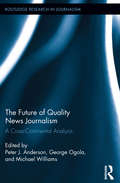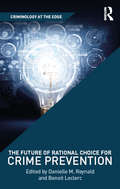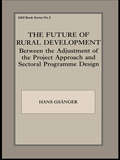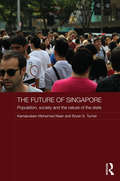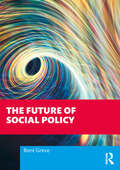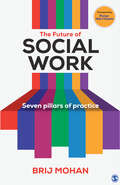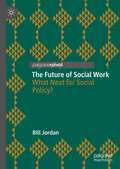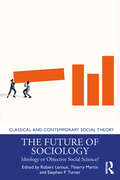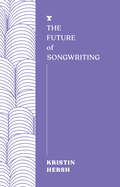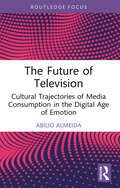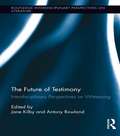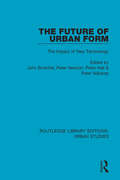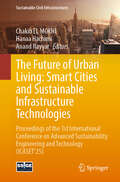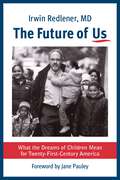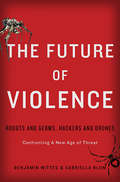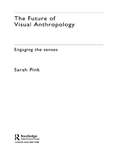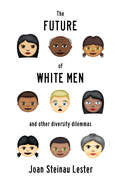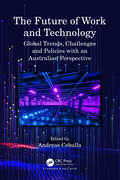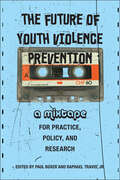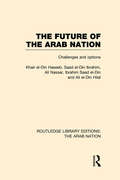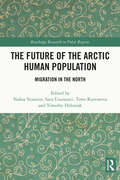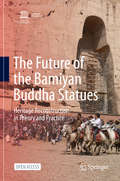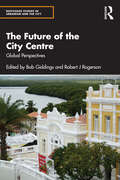- Table View
- List View
The Future of Quality News Journalism: A Cross-Continental Analysis (Routledge Research in Journalism)
by Michael Williams George Ogola Peter J. AndersonIn the face of the continuously changing challenges of the digital age, it is difficult for quality news journalism to survive on any significant scale if a means for adequately funding it is not available. This new study, a follow-up to 2007’s The Future of Journalism in the Advanced Democracies, includes a comparative analysis of possible alternative business models that may save the future of the quality news business across the developed, intermediate, and developing worlds. Its detailed evaluation encompasses also the different ways in which wider key issues are affecting the prospects for quality news as a core ingredient of effectively working democracies. It focuses on the United States, the United Kingdom, South Africa, India, Kenya, and selected parts of the Arab World, providing a comprehensive cross-cultural survey of different approaches to addressing these various issues. To keep the study firmly rooted in the "real world" the contributors include distinguished practitioners as well as experienced academics.
The Future of Rational Choice for Crime Prevention (Criminology at the Edge)
by Benoit Leclerc Danielle M. ReynaldThe rational choice perspective (RCP) is currently the core theoretical approach underpinning situational crime prevention (SCP). To date, many crimes have been studied through the lens of RCP, which increased our understanding of these phenomena, how they are committed and how they could potentially be prevented through SCP. This book, designed with the hope of moving RCP forward for SCP purposes, takes a challenging but novel step in providing leading experts from different disciplines with the opportunity to express themselves on how we could best achieve this task. <P><P> This book explores various perspectives, which include the development of frameworks based on the role of situations in crime or forensic sciences for improving crime prevention practices. The need to consider affective states and other offender-related factors to improve our understanding of offender decision-making models is highlighted as a means to better predict which SCP mechanisms may be most useful in discouraging particular types of offenders. Finally, it is also argued that the use of RCP should be more pragmatic and that this perspective should be preserved and adapted based on what we find in our experiments. <P><P> Taken together, these theoretically distinctive and challenging contributions ultimately guide how crime prevention practices could be best approached in the future.
The Future of Rural Development: Between the Adjustment of the Project Approach and Sectoral Programme Desig
by Hans GsangerThis book gives a practitioner's account of international experiences with rural development seen from a German angle. It argues for a development co-operation for rural areas that actively supports popular participation, beneficiaries' self-organization, decentralization and, consequently, smaller self-managed (para)projects rather than large, top-down organized rural development projects.
The Future of Singapore: Population, Society and the Nature of the State (Routledge Contemporary Southeast Asia Series)
by Bryan S. Turner Kamaludeen Mohamed NasirSingapore, like many other advanced economies, has a relatively low, and declining, birth-rate. One consequence of this, and a consequence also of the successful economy, is that migrants are being drawn in, and are becoming an increasing proportion of the overall population. This book examines this crucial development, and assesses its likely impact on Singapore society, politics and the state. It shows that, although Singapore is a multi-ethnic society, migration and the changing ethnic mix are causing increasing strains, putting new demands on housing, education and social welfare, and changing the make-up of the workforce, where the government is responding with policies designed to attract the right sort of talent. The book discusses the growing opposition to migration, and explores how the factors which have underpinned Singapore’s success over recent decades, including a cohesive elite, with a clearly focused ideology, a tightly controlled political system and strong continuity of government, are at risk of being undermined by the population changes and their effects. The book also compares the position in Singapore with other East Asian countries, including Japan, South Korea and the Philippines, which are also experiencing population changes with potentially far-reaching consequences.
The Future of Social Movement Research: Dynamics, Mechanisms, and Processes (Social Movements, Protest and Contention)
by Jacquelien Van StekelenburgAre the dynamics of contention changing? This is the question confronted by the contributors of this volume, among the most influential scholars in the field of social movements. The answers, arriving at a time of extraordinary worldwide turmoil, not only provide a wide-ranging and varied understanding of how social movements arise and persist, but also engender unanswered questions, pointing to new theoretical strands and fields of research. The Future of Social Movement Research asks: How are the dynamics of contention shaped by globalization? By societies that are becoming increasingly more individualized and diverse? By the spread of new communication technologies such as social media, cell phones, and the Internet? Why do some movements survive while others dissipate? Do local and global networks differ in nature? The authors&’ essays explore such questions with reference to changes in three domains of contention: the demand of protest (changes in grievances and identities), the supply of protest (changes in organizations and networks), and how these changes affect the dynamics of mobilization. In doing so, they theorize and make empirically insightful how globalization, individualization, and virtualization create new grievances, new venues for action, new action forms, and new structures of contention. The resulting work—brought together through engaging discussions and debates between the contributors—is interdisciplinary and unusually broad in scope, constituting the most comprehensive overview of the dynamics of social movements available today. Contributors: Marije Boekkooi, VU-U, Amsterdam; Pang Ching Bobby Chen, U of California, Merced; Donatella della Porta, European U Institute; Mario Diani, U of Trento, Italy; Jan Willem Duyvendak, U of Amsterdam; Myra Marx Ferree, U of Wisconsin–Madison; Beth Gharrity Gardner; Ashley Gromis; Swen Hutter, U of Munich; Ruud Koopmans, WZB, Berlin; Hanspeter Kriesi, U of Zurich; Nonna Mayer, National Centre for European Studies; Doug McAdam, Stanford U; John D. McCarthy, Pennsylvania State U; Debra Minkoff, Barnard College, Columbia U; Alice Motes; Pamela E. Oliver, U of Wisconsin–Madison; Francesca Polletta, U of California, Irvine; Jacomijne Prins, VU-U, Amsterdam; Patrick Rafail, Tulane U; Christopher Rootes, U of Kent, Canterbury; Dieter Rucht, Free U of Berlin; David A. Snow, U of California, Irvine; Sarah A. Soule, Stanford U; Suzanne Staggenborg, U of Pittsburgh; Sidney Tarrow, Cornell U; Verta Taylor, U of California, Santa Barbara; Marjoka van Doorn; Martijn van Zomeren, U of Groningen; Stefaan Walgrave, U of Antwerp; Saskia Welschen.
The Future of Social Policy
by Bent GreveThis book analyses trends and data relating to issues affecting social policy in mature welfare states in Europe, and uses these elements to further our understanding of, and ability to try to say something about, the future of social policy, its direction and content.Looking at the financial crisis of 2008, the refugee crisis in Europe, COVID-19, the climate crisis, ageing populations and the rise of artificial intelligence, it shows how these may also have an impact on future social policy, including what kind of social policy might be needed because of changes in living conditions across the continent.Written by one of Europe’s more prominent social policy experts, this book, the first of its kind, will be required reading for all scholars and students of social policy, social welfare, public policy, sociology and social work.
The Future of Social Work: Seven Pillars of Practice
by Brij MohanSocial media and the digital revolution have fundamentally changed the meaning of "social" and "work." Social work, like all other professions, will undergo dramatic changes as apps and algorithms overtake human operations. The failure of social sciences in general and social work in particular warrants thoughtful innovations that ensure sustainable services. The author believes altruism is professionally unattainable until social work is completely re-founded. The Future of Social Work discusses seven new algorithms of social practice that challenge the existing model of social work education and offers a new perspective for radical transformation of the entire system. The book warns against academic complacence and shows how this radical transformation is necessary in order to prevent inevitable alienation, avarice, and anger in a techno-scientific world.
The Future of Social Work: What Next for Social Policy?
by Bill JordanThis book is an up-to-date analysis of the issues facing the future of the social work profession in the face of rising political authoritarianism, economic inequality and insecurity, class and racial conflicts, fiscal pressure and the COVID-19 pandemic. It provides an account of how these factors interact, and what their consequences are for policy and practice. Reflecting the author's experiences in Europe and Commonwealth countries, the book is international in its scope and analysis. It is suitable for professionals and students alike, and will also be relevant for social policy academics and researchers.
The Future of Sociology: Ideology or Objective Social Science? (Classical and Contemporary Social Theory)
by Stephen Turner Robert Leroux Thierry MartinThis book explores the shift in sociology away from the shared aspiration of the classical transition, of transcending partiality through the construction of a "science of society", in the face of challenges to the notion of objectivity. With the increasing subjugation of sociology to political ideologies and a growing emphasis on "policy", which casts sociology in the role of a provider of intellectual content for political programs, this volume asks whether the situation is the result of an exhaustion of ideas or might perhaps be rooted in the failure in the very program of establishing sociology as a science. Taking seriously the challenges to the classical aspiration of constructing theories that both explain and are grounded in empirical reality, The Future of Sociology asks whether the core idea of transcending ideology is still worth pursuing, and whether there remains scope for making sociology scientific. As such, it will appeal to scholars and students of sociology, social theory, and social scientific methodology.
The Future of Songwriting
by Kristin HershThrowing Muses frontwoman and critically acclaimed solo artist Kristin Hersh meditates on the future of her craft in this wry, existential and passionate addition to Melville House&’s new series, FUTURES.Over a long, hot Christmas in Australia, Throwing Muses frontwoman and critically acclaimed solo artist Kristin Hersh considers her future as a songwriter.Is it possible to create music and not show off about it? How can artists establish and refine a following without becoming part of the commercial problem? And just how many times is it healthy to watch It's A Wonderful Life in 3 weeks?In The Future of Songwriting, Hersh chooses to interrogate these questions through philosophical dialogue. From in-depth conversations with a comedian friend about the similarities between songs and jokes, via a fruitful visit to Sydney's 'bone museums', to a revelation from an acupuncturist in New Orleans, she delivers a fierce, funny and existential meditation on the art of the song – and its future.
The Future of Television: Cultural Trajectories of Media Consumption in the Digital Age of Emotion (Routledge Advances in Sociology)
by Abílio AlmeidaThe book is divided into two sections: one focusing on the phenomenon of television and the other on audiences. It argues that television is changing from a singular object, fixed in a particular place, to a social phenomenon distributed across many devices and platforms. It also argues that audiences are increasingly demanding an ‘open relationship’ with television, as their attention is often distributed across multiple devices and platforms simultaneously. In addition to these aspects, we analyse the evolution of television since its inception, the need for a renewed public service 2.0 in tune with our times, the increasing dominance of talk shows and infotainment, and the new power of television combined with artificial intelligence. These and many other topics are covered in this book, which will be of interest to television professionals, academics in sociology, media studies, and various other fields.
The Future of Testimony: Interdisciplinary Perspectives on Witnessing (Routledge Interdisciplinary Perspectives on Literature #28)
by Antony Rowland Jane KilbyCelebrating the twentieth anniversary of the groundbreaking Testimony, this collection brings together the leading academics from a range of scholarly fields to explore the meaning, use, and value of testimony in law and politics, its relationship to other forms of writing like literature and poetry, and its place in society. It visits testimony in relation to a range of critical developments, including the rise of Truth Commissions and the explosion and radical extension of human rights discourse; renewed cultural interest in perpetrators of violence alongside the phenomenal commercial success of victim testimony (in the form of misery memoirs); and the emergence of disciplinary interest in genocide, terror, and other violent atrocities. These issues are necessarily inflected by the question of witnessing violence, pain, and suffering at both the local and global level, across cultures, and in postcolonial contexts. At the volume’s core is an interdisciplinary concern over the current and future nature of witnessing as it plays out through a ‘new’ Europe, post-9/11 US, war-torn Africa, and in countless refugee and detention centers, and as it is worked out by lawyers, journalists, medics, and novelists. The collection draws together an international range of case-studies, including discussion of the former Yugoslavia, Gaza, and Rwanda, and encompasses a cross-disciplinary set of texts, novels, plays, testimonial writing, and hybrid testimonies. The volume situates itself at the cutting-edge of debate and as such brings together the leading thinkers in the field, requiring that each address the future, anticipating and setting the future terms of debate on the importance of testimony.
The Future of Urban Form: The Impact of New Technology (Routledge Library Editions: Urban Studies #5)
by Peter Hall Peter Nijkamp Peter Newton John BrotchieThis book, first published in 1985, explores the ways in which the editors and contributors predicted the urban system, shaped by emerging technologies, would look like, both nationally and internationally. The technological changes covered include automation in the secondary sector, the effects of energy price rises and threats of shortage, and substitution effects in the energy and vehicle technology areas. Social and economic factors discussed include unemployment patterns, urban activities and lifestyles and their interactions. This title will be of interest to students of urban studies.
The Future of Urban Living: Proceedings of the 1st International Conference on Advanced Sustainability Engineering and Technology (ICASET’25) (Sustainable Civil Infrastructures)
by Anand Nayyar Hanaa Hachimi Chakib El MokhiThis book provides a comprehensive manual for researchers, practitioners, policymakers as well as students striving to achieve environmental sustainment. It is exploring advanced developments in smart cities infrastructure and sustainability engineering. In addition, this book delivers advanced methodologies, emerging and innovative technologies that shape sustainable urban technologies. Including the renewable energy systems of tomorrow, to low-impact manufacturing procedures today; every section provides insight and real-world implementation. The book bridges the gap between theory and practice, making it an essential tool to turn sustainability challenges into opportunities. Salient characteristics comprise: 1. Global perspective: Allows for flexibility in solutions given a multitude of successful examples around the world from different cultural and geographic locations. 2. Multidisciplinary approach: Integrating perspectives from engineering, environmental science, economics and policy studies for holistic problem solving. 3. Financial sustainability: Innovative business models to make sustainable solutions good for the environment and even better economically. This provoking literature questions conventional wisdom and promotes adventurous visions of sustainability. By highlighting emerging trends in cloud computing, cybersecurity, and big data for urban development, readers are prepared to lead the next paradigm shift in sustainable innovation
The Future of Us: What the Dreams of Children Mean for Twenty-First-Century America
by Irwin RedlenerRaymond is a talented young artist who carries his work from homeless shelter to homeless shelter in a tattered bag but has never even been inside a museum. He is emblematic of the children that the renowned pediatrician and children’s advocate Irwin Redlener has met over the course of his long and colorful career. Inadequate education, barriers to health care, and crushing poverty make it overwhelmingly difficult for many children to realize their dreams. In this memoir, Redlener draws on poignant personal experiences to investigate the nation’s healthcare safety net and special programs that are designed to protect and nurture our most vulnerable kids, but that too often fail to do so. The book follows Redlener’s winding career, from his work as a pediatrician in the Arkansas delta, to treating child abuse in a Miami hospital, to helping children in the aftermath of 9/11 and Hurricane Katrina. The reader accompanies him to the board of USA for Africa, to cofounding the Children’s Health Fund with Paul Simon, as he persuades Joan Baez to play a benefit concert for his clinic in rural Arkansas, and to dinner with Fidel Castro. But what has motivated him most powerfully are the children who struggle with terrible adversities yet dream of becoming paleontologists, artists, and marine biologists. These stories are his springboard for discussing larger policy issues that hinder us from effectively eradicating childhood poverty and overcoming barriers to accessible health care. Persistent deprivation and the avoidable problems that accompany poverty ensnare millions of children, with rippling effects that harm the health, prosperity, and creativity of the adults they become. Redlener argues that we must drastically change our approach to meeting the needs of children—for their sake and to ensure America’s resiliency and influence in an increasingly complex and challenging world.
The Future of Violence: Robots and Germs, Hackers and Drones-Confronting A New Age of Threat
by Benjamin Wittes Gabriella BlumThe ability to inflict pain and suffering on large groups of people is no longer limited to the nation-state. New technologies are putting enormous power into the hands of individuals across the world--a shift that, for all its sunny possibilities, entails enormous risk for all of us, and may even challenge the principles on which the modern nation state is founded. In short, if our national governments can no longer protect us from harm, they will lose their legitimacy. Detailing the challenges that states face in this new world, legal scholars Benjamin Wittes and Gabriella Blum controversially argue in [Title TK] that national governments must expand their security efforts to protect the lives and liberty of their citizens. Wittes and Blum show how advances in cybertechnology, biotechnology, and robotics mean that more people than ever before have access to technologies--from drones to computer networks and biological data--that could possibly be used to extort or attack states and private citizens. Security, too, is no longer only under governmental purview, as private companies or organizations control many of these technologies: internet service providers in the case of cyber terrorism and digital crime, or academic institutions and individual researchers and publishers in the case of potentially harmful biotechnologies. As Wittes and Blum show, these changes could undermine the social contract that binds citizens to their governments. In this brave new world of dispersed threats, Wittes and Blum persuasively argue that the best means for safeguarding our liberty and privacy are strong governmental surveillance and security networks. Indeed, they show--through engaging looks at political thinkers from Thomas Hobbes to the Founders and beyond--that security and liberty are mutually supportive, rather than existing in a precarious balance in which the increase in one leads to a proportional decrease in the other. And not only must we bolster our domestic security efforts, but we must think internationally. Our best defense is increasingly a transnational one: more multinational forces and greater action to protect (and protect against) the territory of weaker states who do not yet have the capability to police themselves. [Title TK] is at once an exposé of our emerging world--one in which students can print guns with 3-D printers and scientists’ manipulations of viruses can be recreated and unleashed by ordinary people--and an authoritative blueprint for how government and individuals must adapt to it.
The Future of Visual Anthropology: Engaging the Senses
by Sarah PinkFrom an eminent author in the field, The Future of Visual Anthropology develops a new approach to visual anthropology and presents a groundbreaking examination of developments within the field and the way forward for the subdiscipline in the twenty-first century. The explosion of visual media in recent years has generated a wide range of visual and digital technologies which have transformed visual research and analysis. The result is an exciting new interdisciplinary approach of great potential influence for the future of social/cultural anthropology. Sarah Pink argues that this potential can be harnessed by engaging visual anthropology with its wider contexts, including: the increasing use of visual research methods across the social sciences and humanities the growth in popularity of the visual as methodology and object of analysis within mainstream anthropology and applied anthropology the growing interest in 'anthropology of the senses' and media anthropology the development of new visual technologies that allow anthropologists to work in new ways. This book has immense interdisciplinary potential, and is essential reading for students, researchers and practitioners of visual anthropology, media anthropology, visual cultural studies, media studies and sociology.
The Future of White Men and Other Diversity Dilemmas
by Joan Steinau LesterThis refreshing handbook--equally useful in the boardroom, the classroom, and the living room--captures insightful lessons from personal encounters with diversity. Award-winning author Dr. Joan Lester is a talented storyteller. Her generous voice sheds keen insight, humor and practical advise on the polarizing dilemmas of living with diversity.
The Future of Work and Technology: Global Trends, Challenges and Policies with an Australian Perspective
by Andreas CebullaThis book examines how global technological advances shape the way we work and allocate work today, and how we might do so in the future, exploring advances in robotics, artificial intelligence, green technology and implications for workforce skills and future welfare. It uses Australia as a case study, contrasting the country’s experience to those elsewhere. The book is a cross-disciplinary collaboration that brings together the expertise of engineers, data scientists, economists and sociologists. The reader is offered an overview of the current uses of advanced digital technologies and what it means for today’s workforce, society and economy. The book also looks to the future. Current uses of advanced technologies lag its already existing capability. The contributions note potential future applications of technology and the economic, social and workplace implications of technological change. This book should be of interest to anyone studying and wishing to better understand what work might look like in the future and how we might prepare for likely changes.
The Future of Work for Disabled People: Employment and the New Technology
by Ian Morris Wassily Leontief Walter Y. Oi William F. Gallagher Curt Tausky Timm Kainen Lawrence A. Scadden William J. Dennis Dennis Chamot Jesse M. Smith Erich Bloch Joseph F. CoatesThis important book, by an impressive and talented team of authors, will help us plan to ensure that workers with disabilities find their rightful place in the workplace of the future.
The Future of Youth Violence Prevention: A Mixtape for Practice, Policy, and Research
by Jean Rhodes Jorja Leap Karen L. Bierman Joel M. Caplan Neal Halfon Demetrius Smith Raymond W. Novaco Jonathan Jay Stephanie Bonne Janice Johnson Dias Stanley J. Huey Jaleel Abdul-Adil Elizabeth S. Barnert Fiorella L. Carlos Chavez Liza Chowdhury Isaias Contreras Zion Crichlow Katrina J. Debnam Robyn D. Douglas Noni K. Gaylord-Harden Alejandro Gimenez-Santana Cheryl Grills Matthew Hagler Casey Keene Katherine Kelton Jill Kochanek Joyce Lee Marsha Levick Krista Mehari Shenna Morris Sierra Mullan Corey Prachniak-Rincón Peter H. Rej Joseph B. Richardson Emily N. Satinsky Ashli J. Sheidow Rebecca Slotkin Claire Terrebonne William Wical Samson StylesThe Future of Youth Violence Prevention: A Mixtape for Practice, Policy, and Research focuses on innovative approaches to youth violence prevention that utilize consistent principles found within existing best practices but are dynamic and adaptable across settings—and the sociohistorical and cultural realities of those settings. This book features scholars anchored in applied practices who can ground these forward-thinking strategies in the substantive base of research and theory that has produced successful interventions across multiple disciplines. The scholarship and cutting-edge thinking assembled in this volume could produce new-era youth violence prevention coordinators prepared to serve in any setting—including community outreach programs, therapeutic group homes, day reporting centers, juvenile probation offices, schools, or clinics. These coordinators will be able to cocreate intervention techniques using core prevention elements drawing from a range of ideas and a multitude of disciplines while embracing the assets and resources already in place.
The Future of the Arab Nation: Challenges and Options (Routledge Library Editions: The Arab Nation)
by Roger Owen Khair el-Din Haseeb Saad el-Din Ibrahim Ali Nassar Ibrahim Saad el-Din Ali el-Din HilalWhat is the place of the Arab states as a new world order emerges? How can the Arab world respond positively to change as the new Europe emerges, political relationships are restructured, and the information revolution transforms the global economy? To what extent are the Arab states in danger of falling prey to increasing disunity and fragmentation? The book is the result of a major research programme in which Arab social scientists outline some of the paths which could be taken by the Arab world over the next 25 years. It presents a detailed analysis of resources in the Arab world – including population, employment, oil and water supplies and the trade and investment situation. The authors argue for greater popular participation and reassert the argument that only by pooling resources effectively can the Arab states establish their place in a world of national and supra-national blocs.
The Future of the Arctic Human Population: Migration in the North (Routledge Research in Polar Regions)
by Timo Koivurova Satu Uusiautti Nafisa Yeasmin Timothy HeleniakThe Future of the Arctic Human Population seeks to explore the challenges of Arctic migration, immigrants, and refugees and how integrated societies can be developed. Moreover, it discusses disparities between regions on policies and their implementation. This book explores how cross-border cooperation is needed to provide innovative solutions to migration challenges such as cultural differences, acceptance, and integration into local communities, and joining the labour market. It examines whether there are regional differences in well-being among immigrants in Arctic countries. The book considers how we can build and model integrated societies, and what tools and measure can be used to assess inclusive and resilient societies.
The Future of the Bamiyan Buddha Statues: Heritage Reconstruction in Theory and Practice
by Masanori NagaokaThis Open Access book explores heritage conservation ethics of post conflict and provides an important historical record of the possible reconstruction of the Bamiyan Buddha statues, which was inscribed in the UNESCO World Heritage List in Danger in 2003 as “Cultural Landscape and Archaeological Remains of the Bamiyan Valley”. With the condition that most surface of the original fragments of the Buddha statues were lost due to acts of deliberate destruction, this publication explores a reference point for conservation practitioners and policy makers around the world as they consider how to respond to on-going acts of destruction of cultural heritage.Whilst there has been an emerging debate to the ethics and nature of heritage reconstruction, this volume provides a plethora of ideas and approaches concerning the future treatment of the Bamiyan Buddha statues. It also addresses a number of fundamental questions on potential heritage reconstruction: how it will be done; who will decide; and what it should be done for. Moreover when it comes to the inscribed World Heritage properties, how can reconstructed heritage using non-original materials be considered to retain authenticity? With a view to serving as a precedent for potential decisions taken elsewhere in the world for cultural properties impacted by acts of violence and destruction, this volume introduces academic researches, experiences and observations of heritage conservation theory and practice of heritage reconstruction. It also addresses the issue not merely from the point of a material conservation philosophy but within the context of holistic strategies for the protection of human rights and promotion of peace building.
The Future of the City Centre: Global Perspectives (Routledge Studies in Urbanism and the City)
by Bob Giddings Robert J RogersonThe Future of the City Centre: Global Perspectives debates future directions. It looks beyond the post-industrial, post-commercial, and post-retail city centres to examine differing visions of the future form and function of the urban core. This theme and the related sub-topics will assist the development of future city models and help to contextualise urban change. The in-depth research covers not only urban form and the re-use of the built heritage but also the provision for cultural events and different forms of entertainment that will offer vitality, together with visitors and responsible tourism. City authorities are starting to realise that structural changes are happening in city centres, as their influence is declining, and therefore new forms of governance will be needed. The book is based on an international research network hosting four symposia over 24 months. They took place in four cities in four different continents to encompass a world view of developed and developing countries. This book offers theoretical and practical perspectives from leading thinkers, academics, and practitioners, drawing on thematic issues explored across four international cities: Newcastle, UK; Newcastle, Australia; Pretoria-Tshwane, South Africa; and João Pessoa, Brazil. It draws on a wider set of global examples to reveal the shared issues and pressures being brought to bear on city centres and the diversity of responses being undertaken to ensure their long-term future. The book includes illustrations from cities around the world, and it is directed at academics, students, and professionals in architecture, planning, urban design, the built environment, geography, economics, sociology, and cultural studies.
